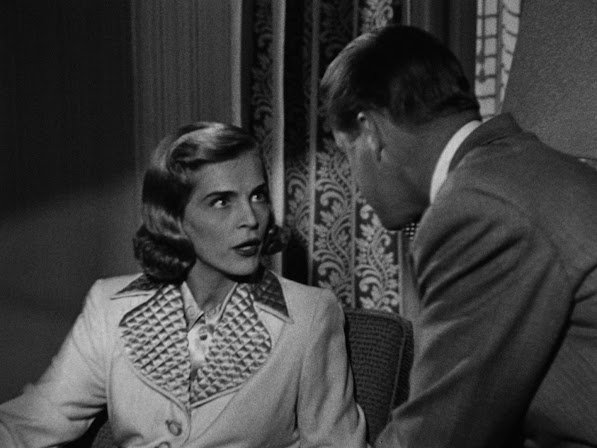You're in over your head, buddy!
Claire Trevor was a Femme Fatale in multiple films...
…and Joan Bennett likewise has lent her talents to many a noir (with more to come before Easter!).
But it's not just the top-billed actors who get repeat engagements. Hollywood of the 1930s and 40s often felt more like a repertory company, and it's not unusual to see a lot of familiar faces in various supporting roles.
Elisha Cook Jr. has turned up in quite a few of these films, usually playing a nebbish on the fringes of respectable society.
Esther Howard's cantankerous old lady has turned up in three of the films we have seen thus far this season... as I'm sure everyone has noticed!
But there is one actor we have (astonishingly) yet to encounter in any of the films I have shown thus far. I say "astonishingly" because he was, for a while, something of an institution in the world of 1940s noir.
Skinny and jovial, often dressed in a bow-tie and boater, Dan Duryea doesn't look like he would necessarily be a threat to anyone. But after a few minutes onscreen, you start to realise that he's the kind of guy you need to watch out for.
And he's going to feature in all the remaining films we'll be seeing between now and Easter.
The first of these is Too Late for Tears, a low-budget, independent noir released in 1949 starring Duryea and the husky-voiced Lizabeth Scott (here playing the Femme Fatale to end all Femmes Fatale).
Too Late for Tears begins when a blackmail payoff intended for Dan Duryea is mistakenly deposited with Lizabeth Scott and her husband (Arthur Kennedy).
What happens when a nice, middle class American couple suddenly find themselves in possession of an illicit sixty thousand dollars? I guess we'll never know, because Lizabeth Scott gets hold of it first, and everyone in the film needs to get out of her way or, well, just watch out.
Dan Duryea turns up to reclaim the ill-gotten gains that were supposed to be his, and he quickly realises that he is seriously out of his depth when dealing with her.
Too Late for Tears was released without much fanfare at the time, but has since come to be recognised as a quintessential examination of the Femme Fatale archetype. Lizabeth Scott lived to be 91 (or 92, depending on which account you believe) and so got to witness the restoration and re-appraisal of this neglected noir in 2014.
Like Detour (which I screened earlier in the series) Too Late for Tears is a prime example of a minor, low-budget thriller that proves to be a lot more stylish and memorable than one might expect. And it stands today as a visceral reminder that the Femme Fatale can be anyone; even the perfect American housewife.
We will screen Too Late for Tears at 7.30 on Thursday, the 27th of March at the Victoria Park Baptist Church.



















Comments
Post a Comment